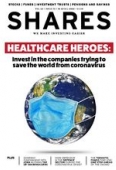Archived article
Please note that tax, investment, pension and ISA rules can change and the information and any views contained in this article may now be inaccurate.
£2bn raised by London-listed companies in race for cash

Approximately £2bn has now been raised by 63 London-listed companies since the start of March as businesses race to strengthen their finances during the coronavirus crisis. Of these, 34 companies have each raised £5m or more, nearly all at a discount to the market price before the fundraising was announced.
So far the biggest raises have been by cruise ship operator Carnival (CCL) for £400m, online fashion retailer ASOS (ASC:AIM) for £247m, travel retail firm SSP Group (SSPG) for £215m, recruitment firm Hays (HAS) for £200m and car-selling portal Auto Trader (AUTO) for £186m.
Companies are generally increasing their issued share capital by a fair chunk in order to secure new cash, thereby diluting existing investors.
At one end of the spectrum is Auto Trader which only issued 5% of its existing capital, while at the other extreme City Pub Group (CPC:AIM) intends to issue almost 42% of its existing capital in new shares to raise just £22m, assuming there is full take-up of its open offer component of the fundraise.
The average share price gain upon the fundraising news for the top 10 equity raisers was 11%, which suggests investors believe the companies are doing the right thing by coming to the market for money.
MAKE OR BREAK
So why are companies raising money now, and why are they tapping shareholders instead of using the Government’s £330bn Covid Corporate Financing Facility which is there specifically to provide funding for companies that need it?
Online retailer ASOS said the £247m equity raise and the extension to its debt facilities would ‘put sufficient financing in place to weather no improvement in current trading for at least 18 months’, and would enable it to emerge from the current crisis in a stronger financial position to continue to invest in the growth of the business.
Reading between the lines, we suspect that in exchange for agreeing to extend its debt facilities and loosen its covenants, the banks told ASOS to go and tap the market for money to offset some of their risk.
This is also no doubt what happened at Carnival which had to go cap in hand to investors by issuing new shares while at the same time issuing billions in debt at interest rates as high as 11.5%.
OPPOSING VIEWS
While most investors are bracing themselves for more cash calls, Invesco fund managers Mark Barnett and Martin Walker wrote to 200 or more UK companies last week warning them that the case for raising equity had to be compelling.
Barnett and Walker said that unless companies had ‘a strong rationale’ for coming to the market to raise money they wouldn’t support them, and they urged companies to make use of the £330bn Government Covid scheme instead. They said that current market valuations mean that equity is both ‘precious and expensive’.
QUALITY FIRST
According to Oliver Brown, co-manager of the MFM Primary Opportunities Fund (B8HGN52) which specialises in buying new and secondary issues, a telling feature of the current crop of fund raisings is the above-average quality of the companies which have come to the market first.
‘SSP and WH Smith are world-leading businesses with great assets and great margins, and their share prices are down 50% or more. In a year or so these firms will be back trading “normally” again,’ he says.
In the case of premium chocolatier Hotel Chocolat (HOTC:AIM), the firm raised funds to finance the expansion of its production facilities and more store openings in Japan, notes Brown.
Peel Hunt says additional liquidity/strengthening the balance sheet is the most cited reason for getting new cash from shareholders. ‘However, some have flagged that the funds will be used on working capital or acquisitions, which points to more medium-term thinking and potential for share gains,’ it adds.
FINANCIAL ADVANTAGE
Recruiter Hays raised £200m from its top shareholders because it saw a long-term opportunity and didn’t want to take on debt.
It says raising cash will allow it to capitalise on organic growth opportunities with new and existing blue-chip clients. In fact it says it is already seeing new opportunities emerge.
As finance director Paul Venables explains to Shares: ‘The coronavirus crisis is a defining moment. No-one has witnessed such a uniform drop in activity before and no-one knows when it will end, but we are now the best-capitalised firm in the sector and we are already attracting new business.’
He says clients are looking to reduce their number of suppliers to those that are financially sound, which should work to Hays’ advantage. Venables adds: ‘You don’t want debt in good times and you certainly don’t want it in bad times when you have no idea how long the recovery could take.’
While Hays has deferred £100m in taxes in line with Government guidelines, those taxes are effectively ‘debt’ which will have to settled at some point. Companies which take on additional debt at this point – including from the Government’s Covid facility – risk ultimately breaking their banking covenants, warns Venables.
Important information:
These articles are provided by Shares magazine which is published by AJ Bell Media, a part of AJ Bell. Shares is not written by AJ Bell.
Shares is provided for your general information and use and is not a personal recommendation to invest. It is not intended to be relied upon by you in making or not making any investment decisions. The investments referred to in these articles will not be suitable for all investors. If in doubt please seek appropriate independent financial advice.
Investors acting on the information in these articles do so at their own risk and AJ Bell Media and its staff do not accept liability for losses suffered by investors as a result of their investment decisions.

 magazine
magazine









